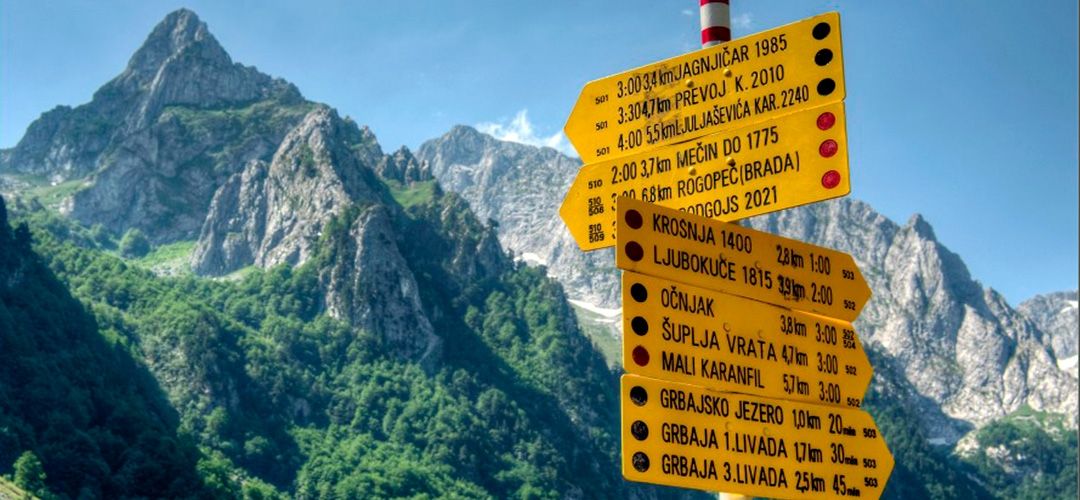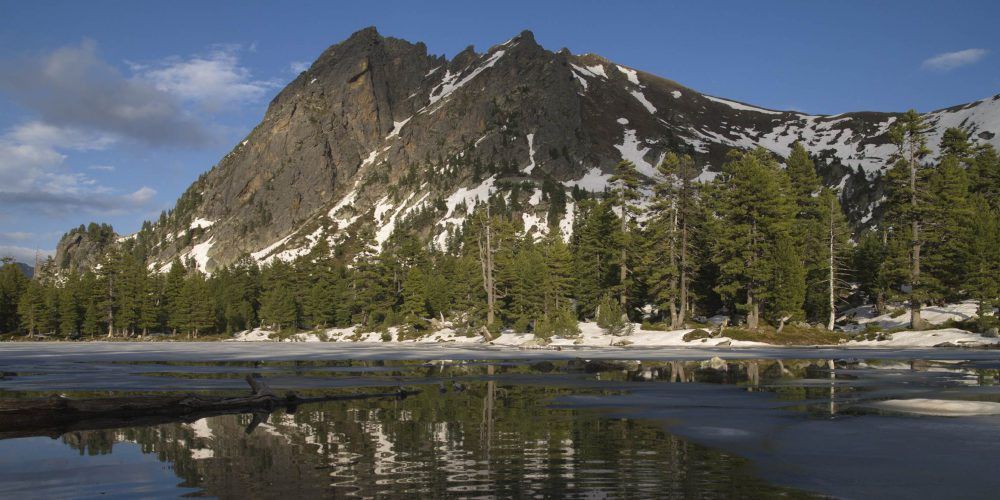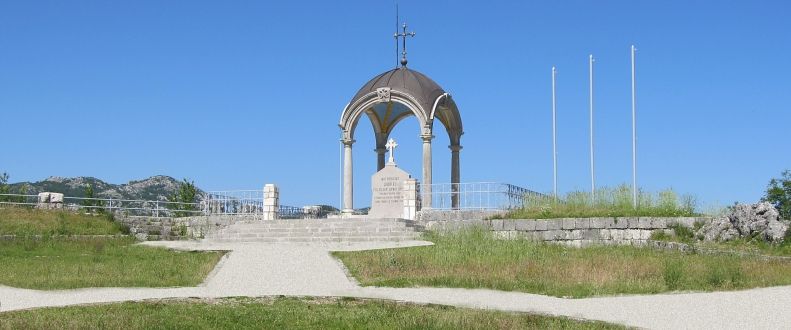Displaying items by tag: montenegro
28 January 2019 - The unique mountain massif of Prokletije is recognized as a region of exceptional landscape features with rich biodiversity. Because of its beauty, inaccessibility and untouched nature, Prokletije became a favourite destination for an increasing number of tourists, especially mountaineers and alpinists. On the other hand, residents who inhabit this area are struggling to improve the quality of life. These residents often migrate towards urban centres or even go outside the country in search of a better life, while the strong potential of this region's development remains untapped. As in Montenegro, a similar problem is evident in the area of Prokletije on the other side of the border, on the territory of Kosovo.
In order to achieve sustainable development of the cross-border region through joint tourism potentials based on natural and cultural heritage, the implementation of the cross-border project "Development of Ecotourism in the Balkan Alps" has started. During the next two years, which mark the duration of the project, the activities that will contribute to the quality and diversity of services, the establishment and promotion of a joint tourist offer have been planned, as well as activities that will enable increased safety of the visitors of the National Park Prokletije in Montenegro and the National Park Bjeshkët e Nemuna in Kosovo.
Due to the inaccessibility and the unique nature of the area, apart from creating a new tourist offer, the focus of the project is the safety of tourists. Many interventions in rescuing lost or injured tourists show the need for the reconstruction of the tourist infrastructure so that during this year, a total of 50 kilometres of hiking trails will be assessed from the safety aspect and reconstructed if necessary.
In the forthcoming period, intensive work will be done to build professional facilities for tourist service providers, to strengthen the capacities of local communities and the private sector with the aim of developing a unique tourist offer and increasing the safety of tourists. The lack of trained planner guides is evident, which is also evidenced by the already mentioned frequency of accidents in the mountains. Therefore, this project will offer training to specialized guides and implement a joint mountain rescue training to enhance cross-border cooperation in helping lost or injured tourists.
Considering that National park Prokletije represents a destination that is perfect for nature lovers, rich in local endemic and endangered species of plants, birds and mammals, the project will include intensive work in order to promote nature-based tourism. The project will include training for guides in the field of biodiversity, and the individuals will be trained to observe birds, collect medicinal herbs, mushrooms.
The project "Development of Ecotourism in the Balkan Alps" is implemented by the Centre for the Protection and Study of Birds in cooperation with the Mountain Rescue Service of Montenegro as well as the partners from Kosovo - Kosovo Advocacy and Development Centre (KADC) and Mountaineering and alpinists association "Pashtriku". It is financed by the European Union through the IPA II program Montenegro - Kosovo 2014-2020 and the Ministry of Public Administration of Montenegro.
Source: Boka News
27 January 2019 - Montenegro has a large number of museums and galleries, all dotted around the country. This charming country has a rich history, so every region within the Montenegrin border has a museum with fascinating historical artefacts specific to the area.
The National Museum of Montenegro is a complex cultural institution which consists of different museums and many buildings, churches, and houses that comprise each museum, all of which are housed in buildings of utmost historical and cultural importance. This institution was officially founded in 1896, the year of enacting the Law on Royal Montenegrin Library and Museum.

The central “theme” within the National Museum is the material and spiritual history of the territory now known as Montenegro and the people that have lived there. This museum records the history of Montenegro chronologically starting with ancient ruins and findings and continuing through to the 18th century. Everything from war relics to furniture, artworks and historical documents are on display in the museums.
Located in Cetinje, Montenegrin Old Royal Capital, the National Museum is composed of four museums: Museum of History (composed of the King Nikola Museum, Museum of Petar II Petrovic Njegoš, Njegoš`s birthhouse, Njegoš`s Mausoleum on Lovćen, the court church Cipur, the Mausoleum of Bishop Danilo on Orlov krš and the the Raised-relief Map Pavillon), the Art Museum with the Modern art gallery Dado Đurić, the Ethnographic Museum and the newly founded Archaeological Museum with Lapidarium.

The buildings which represent segments of the National Museum are all located in central Cetinje, with the exception of Njegoš's house of birth, which is in the village of Njeguši towards Lovćen National Park.
National Museum of Montenegro performs various professional services (such as conservation, documentation, information collection and others) and it contains archival and library departments with approximately 50.000 bibliographical and 100.000 archival units.

Collection of museum exhibits on the territory of present-day Montenegro can be traced back to the ancient past. In a modern sense, however, it is possible to record the traces as of late fifteenth century, the time when Cetinje was established as a political and spiritual centre of Montenegro. The exhibition items include book collections, written and printed documents, issues related to church history - holy paintings - icons, paintings, sculptures, prints, drawings, installations; war relics, flags, weaponry, furniture and various types of ethnographic items covering the entire ethnographic subject matter of present-day Montenegro.
The museum departments dedicated to particular individuals that have left their marks within the history of Montenegro – Prince-Bishop and writer Petar II Petrovic Njegoš and the last Montenegrin King Nikola I Petrovic Njegoš - have special appeal to all visitors, local and foreign.
The tour to the National Museum of Montenegro often includes a brief history on Cetinje, Old Royal Capital of Montenegro, which is a wonderful testimony to the past times, the foundation of Montenegrin identity and spirituality. Cetinje is perhaps the smallest European capital, but it is the city of the great history and charm, which will certainly attract you.
If you are interested in learning about Montenegrin history, or want to find out more about Montenegrin artists, be sure to explore the country's cultural capital, and set aside part of your time for the National Museum complex.
Source: National Museum of Montenegro Official Website
26 January 2019 - Montenegrin Ministry of Defense and Armed Forces of Montenegro have initiated the procurement procedure for 67 armored all-terrain vehicles to be used by the Army of Montenegro. The Ministry plans to borrow 30 million EUR for the purchase of 67 armored all-terrain vehicles, as envisaged by the 2019 Budget Law. The government’s documents state budget allocations for 2019 will go up by 2.98% compared to last year, due to vehicle purchases and payment of installments for helicopters, writes Pobjeda daily.
“After all tactical and technical characteristics had been determined, the Ministry of Defense consulted some of the world’s top vehicle producers from different countries. So far, we have had consultations with the following companies: Iveco Defence Vehicles – the Republic of Italy, Urovesa – Spain, Nurol Makina, and BMC – the Republic of Turkey, Elbit Systems – Israel, Lockheed Martin, and Oshkosh Defence LLC –the United States of America,” the Ministry of Defense told Pobjeda daily.
When asked about the fundamental characteristics of the armored all-terrain vehicles that are to be purchased, the Ministry said special attention would be paid to meeting the international standards. In addition, the Ministry will also strive for meeting the existing international standards in the area of protection and security of the crew belonging to defense.
The Government’s documents state that finds for defense will make 2,98% of GDP in 2019, more than predicted by NATO standards and caused by the provision of armored vehicles and payment of installments for helicopters.
“Profit that the Ministry of Defense makes by selling armament, selling and renting former military property (immovable) and provision of services, as well as the funds on the basis of refunding costs by NATO, will amount up to 5.000.000 EUR and will be used for the achievement of partnership objectives and equipment of the Army, inclusive of uniforms,” said representatives of Ministry of Defence of Montenegro.
During September 2018, Armed Forces of Montenegro bought two new Bell 412 EPI multi-purpose helicopters. Bell 412 EP/EPI multi-purpose four-wheeled helicopters are designed for the transport of passengers, injured and sick people, search and rescue, cargo transfer, fire extinguishing, and border control. The capacity of the delivered version is 13 seats.
26 January 2019 - "Good news for the agriculture sector is that Agro budget for this year amounts to 52.4 million EUR and it is higher by 12.4 million EUR or 31% compared to the previous year. Just as we have announced: greater funds and grants programmes will be provided for the more dynamic development of our agriculture," Deputy Prime Minister and Minister of Agriculture and Rural Development Milutin Simović said.
At the presentation of 2019 Agro budget, held today in Rvaši, DPM Simovic assessed that this year's Agro budget is both European and domestic.
To maximize the use of Agro budget funds, according to Simović, support measures will be presented to potential users on the ground in direct communication with hosts, entrepreneurs, and local communities.
Such an approach, he said, will be a special obligation and an individual responsibility for everyone in the Ministry and the competent administrations.
The Agro budget defines three areas of support: agriculture, fisheries, and operational programmes. A total of 58 measures have been defined. This year's Agro budget, as Simović pointed out, was created on the basis of an analysis of the implementation of measures of the previous Agro budget, followed by suggestions and observations by the users and implementation services, with numerous recommendations from the associations of producers and processors and local self-government, which were accepted within the limits of financial possibilities and in accordance with our agrarian policy.
The Deputy Prime Minister pointed out that the Agro budget continues with a wide range of users both in livestock and plant production, with the dominant participation of small farms.
He said that in the first half of the year, the implementation of 56 already agreed on IPARD-like projects is expected and that this year will be the first year of implementation of the big IPARD.
"We are sure that this will be the year of great investment momentum in our agriculture both in the processing sector and in primary production. That is why we have planned the implementation of 21.5 million EUR through this measure," Simović stressed.
This year's ambition is to publish new IPARD calls for support to processing and primary production, as well as to accelerate the process of accreditation of a new measure to support the diversification of activities in rural areas.
The support programme for young farmers will be implemented this year, with grants of 10 thousand EUR per farm.
26 January 2019 - According to the latest data of the Central Bank of Montenegro (CBM), 77 people are registered in Montenegro with more than one million EUR in accounts in domestic banks. This data implies that in 2018 Montenegro registered 13 new millionaires.
The number of new millionaires and the total population of millionaires set records. The account with the largest sum of money is owned by the citizen of Montenegro whose account amounts to 50,3 million EUR, according to News Agency Pobjeda’s source from the Central Bank of Montenegro. The source revealed the information without naming the individual because doing so is prohibited by law.
"The account with the largest sum of money deposited by an individual amount to 50,281 million EUR and belongs to a single resident. 77 individuals have a deposit in a bank in the amount of more than 1 million EUR," the CBM source said.
The source also revealed that the richest millionaire has deposited 20 million EUR more than the largest deposit by a legal entity in Montenegro. In 2017, there were 64 millionaires in Montenegro, and in 2016, the number of millionaires in Montenegro amounted to 54.
According to the last census, Montenegro has 622,471 inhabitants.
26 January 2019 - According to preliminary data collected by Statistical Office of Montenegro - MONSTAT, the total foreign trade of Montenegro for the period January-December 2018 amounted to 2.954,4 million EUR, indicating an increase of 10% in relation to the same period of the previous year.
The export of goods amounted to 400 million EUR, and the value of imports was estimated to be 2,554 million EUR. Compared to the same period of the previous year, exports increased by 7,7%, while imports increased by 10,9%.
The coverage of import by export was 15,7% and it was lower compared to the same period of the previous year (16,1%).
According to the Standard International Trade Classification (SITC), the most common export products, which amounted to 107,2 million EUR, including sector 6 products: non-ferrous metals - 74 million EUR and iron and steel – 18,9 million EUR and others.
According to the SITC, the most common import products are Machines and transport devices (sector 7) in the amount of 638.1 million EUR. Machines and transport devices include Road vehicles – 187,2 million EUR and Electrical machinery, apparatus and devices – 124,3 million EUR and others.
The largest foreign trade partners in exports were: Serbia (93 million EUR), Hungary (46 million EUR) and Bosnia and Herzegovina (31 million EUR).
The largest foreign trade partners in import were Serbia (492 million EUR), China (257 million EUR) and Germany (235 million EUR). The foreign trade of goods was mostly conducted with the signatories of CEFTA and with the member countries of the European Union.
24 January 2019 - In the area of customs policy, Montenegro has largely harmonised its legislation with the European one, and the modernization of the customs service will remain a priority this year, so that, with a greater volume of international trade and raising the standard of living, Montenegrin society would be safe, it was noted in the debate on chapter 29 - Customs Union.
Today a public debate was organized in Podgorica on Chapter 29 and the importance of a customs union for citizens and businesses, under the EU4ME project funded by the European Union and implemented by UNDP.
Chief Negotiator Aleksandar Drljević reminded that Montenegro opened negotiations at the end of 2014 on Chapter 29 and that three final criteria for closing this chapter were defined. They are related to further harmonisation with European legislation and its application, as well as the progress achieved in the development of interconnected IT systems, which is a major challenge.
"When it comes to Montenegrin business people and entrepreneurs, removing customs barriers will give an opportunity for unhindered product placement, which will facilitate the export of domestic goods to the market of about 500 million consumers. Networking of business entities and increase of exports will positively affect the trade balance and the overall business environment in Montenegro. On the other hand, our citizens will have access to better quality products from EU countries at significantly lower prices due to increased competitiveness," Drljević added.
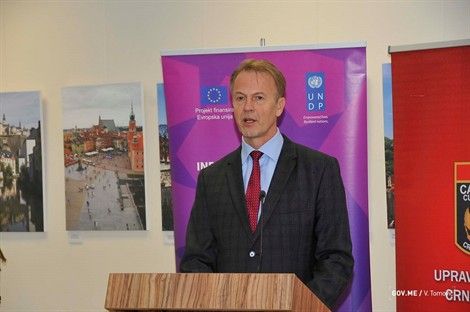
The Head of the EU Delegation to Montenegro, Aivo Orav, reminded that the EU supports the Government of Montenegro in the demanding and expensive task of establishing effective control at the borders, through the financing of the implementation of the New Computerized Transit System (NCTS), which is the basis for the establishment of other necessary IT systems, in order to protect Montenegrin citizens, public health, the environment and cultural heritage.
He pointed out that Montenegro has achieved a lot in this area, but further progress is needed in certain areas, especially when it comes to the implementation of measures to facilitate trade and work on capacity building of customs officers and the provision of adequate staff.
Director of the Customs Administration Vladan Joković pointed out that increased volume of international trade and global threats, such as terrorism, organised crime and trade in dangerous materials, led to major changes in the roles and responsibilities of customs officers, which today represent the first line of defense against numerous criminal organisations. For this reason, the primary task of the customs services is to ensure the necessary balance between protecting society and facilitating trade, adding that the development IT system is a major challenge in this negotiating chapter, bearing in mind that a large number of financial investments will be required.
"The work on strategic projects, obligations fulfillment in the EU agenda, simplification of customs procedures, further strengthening of cooperation with the business environment and uncompromised ties with institutions in terms of strong integrity are priorities in 2019,” Joković said.
The panel on "Importance of Customs Union for Citizens and Economy" was addressed by the Dean of the Faculty of Economics, prof. Nikola Milović, prof. Vladimir Savković from the Faculty of Law, Vice President of the Chamber of Economy of MontenegroLjiljana Filipović, representative of the company "Stadion doo Podgorica", Snezana Terzić, as well as representatives of the customs services of Slovenia and Montenegro Jože Kavčić and Tatjana Vujisić.
25 January 2019 - The Herceg Novi Pensioners Association donated food and provisions in order to provide assistance to socially vulnerable citizens and thus supported the action of the famous humanitarian Zorica Drakulić Vidaković.
Zorica Drakulić Vidaković is a person of a great heart, who, since she was little, has been helping those who have been deprived of the most basic resources in life - food, clothing, a home, and healthcare. Thanks to her insoluble desire and willingness to help those in need to the best of her ability, often putting her own need aside, Zorica is a driving force and participant in numerous humanitarian actions, for which she has been awarded the prestigious annual ISKRA Fund for Active Citizenship.
Vidaković, with the help of her associates, launched a new humanitarian campaign aimed at helping single mothers and families with low income. "Be a donor, a gift provider and help us as you have so far. Thank you in advance to everyone who will respond to the movement," said Drakulić Vidaković.
The donation from the Pensioners Association was used to buy food and supplies for single mothers with several children.
The representatives of the local community association point out that the money for the donation is pulled from the pensioners’ modest fund in order to help the vulnerable.
This initiative was aimed at all people, primarily those in the Red Cross and municipal structures, in order to awaken their sympathy for those who are troubled and in need.
They also called on all humane people to more actively participate in helping the vulnerable citizens of Herceg Novi, as there are plenty of those living on the verge of existence.
Of the 1,700 members of the Local Pensioners' Association of Herceg Novi, most are with low incomes, and 127 of them do not yet have their own roof over their heads.
25 January 2019 - The implementation of the largest Turkish investment project in Montenegro, which is the construction of a hotel with two towers with 15 floors, is being prohibited by the Municipality of Budva, yet the Ministry of Sustainable Development and Tourism of Montenegro recently gave its consent to the preliminary design.
However, the question remains whether the investment will succeed, given the numerous problems, including property-legal relations for the land.
The Podgorica-based company "Mia Investments" of the Turkish founders intends to build a five-star hotel at the attractive land complex at the Adriatic Fair, only ten meters from the Slovenska plaža (beach), which would consist of two towers - 15-story solitaire.
Chairman of the board of directors of "Mia Investments" is Sener Ahmet Ozan, while members of the board are Kader Murat, Tito Orfea and Arikan Habip.
The land complex consists of about 8,500 square metres, which is still in the cadastral register registered with the company "Safiro Beach Resort", whose founder is the company "Expom Hotel Partners Limited" based in Cyprus.
The construction of the towers is being prevented by the Municipality of Budva, which opposes building a multi-story building on the coast itself.
In August 2018, the Turkish company submitted a request to the chief architect of the Municipality of Budva to give the consent to the preliminary design, but the procedure was terminated after the Property Protection Secretariat was recognized as a party within the proceedings.
The construction of the two towers in Budva would be the most significant investment of Turkish investors in the Montenegrin hotel business. However, it is known that with the new legal solutions, the builders of 5-star hotels have the opportunity to sell half of the units as apartments for the market. Although a detailed urban plan "Budva Centre" covering this site has been put off for two years, only hotels are allowed to be built within the municipality.
Source: Investitor
25 January 2019 - The time of the completion of Montenegro's negotiations with the EU, which have so far lasted for six and a half years, will also depend on how and to whom the Montenegrin Government will give economic citizenship. This new condition derived from the European Commission (EC) Report on the risks of investor citizenship and residential schemes in the EU.
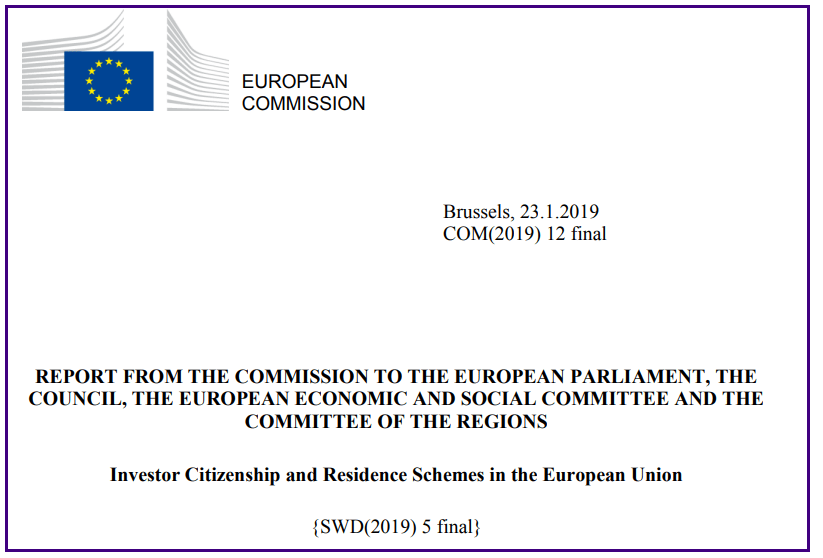
"Concerning third countries setting up investor citizenship schemes, which may have security implications for the EU, the Commission will monitor investor citizenship schemes in candidate countries and potential candidates as part of the EU accession process. It will also monitor the impact of such schemes by EU visa-free countries as part of the visa-suspension mechanism," the EC Report said.
The part of the report on "third countries" states that candidate countries and potential candidates for EU membership "become more attractive to investors" given the prospect of becoming their citizens and the citizens of the EU.
This is, as stated in the EC Report, already the case as the citizens of the candidate countries and potential candidates have the right to enter the Schengen countries "for short stays," or for three months during the year.
“Investor residence schemes, while different from citizenship schemes in the rights they grant pose equally serious security risks to the Member States and the EU as a whole. A valid residence permit gives a third-country national the right to reside in the Member State in question, but also to travel freely in the Schengen area. While EU law regulates the entry conditions for certain categories of third-country nationals, the granting of investor residence permits is currently not regulated at EU level and remains a national competence,” says the Official Report.
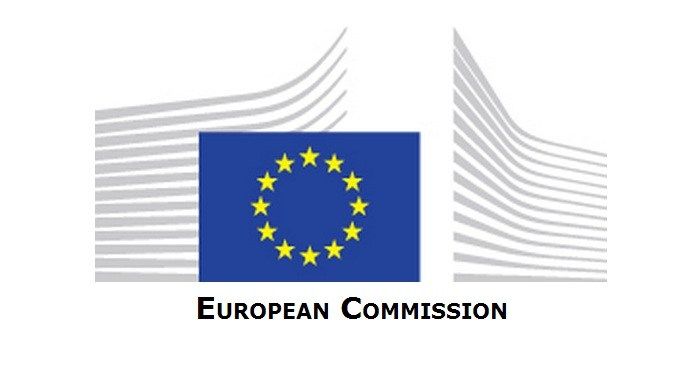
The report maps the existing practices and identifies certain risks such schemes imply for the EU, in particular, as regards security, money laundering, tax evasion, and corruption. "A lack of transparency in how the schemes are operated and a lack of cooperation among the Member States further exacerbate these risks," the report finds.
It is expected, furthermore, that the countries concerned will have very robust systems for monitoring these programs, including systems to combat possible security risks, such as money laundering, terrorist financing, corruption and infiltration of organized crime related to such programs. The EC sent a warning to the possibility of suspending the visa-free regime to Moldova, which is the third country mentioned in the report. In 2013, Moldova signed an EU Accession Treaty with the EU to apply the visa-free regime that has been in force since 2009 for Montenegro and most of the Western Balkan countries since the following year.

